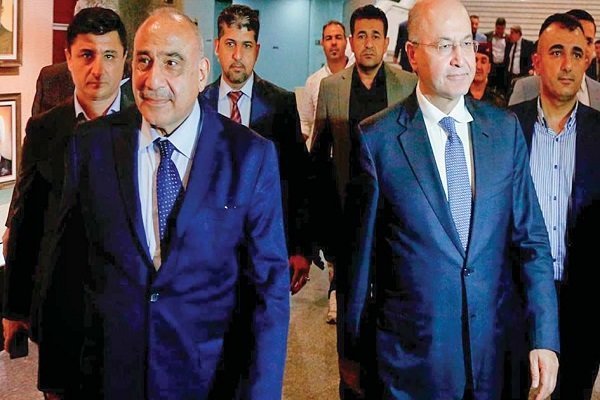Abdul Mahdi, on path to form a cohesive, national Iraqi cabinet

TEHRAN – Adel Abdul Mahdi, an Iraqi politician, was elected as the prime minister of Iraq by the new President Barham Salih.
After months of deadlock of inconclusive national election, on October 2, the new Iraqi President Barham Salih picked Shi’ite Adel Abdul Mahdi as the prime minister.
As is required by the Iraqi constitution, Abdul Mahdi must submit his cabinet for parliamentary approval within 30 days of his election, or else another person will be appointed for that task.
After his election as prime minister, Abdul Mahdi quickly started his political efforts and consultations with parties to form the cabinet, and on that he has held various meetings with the heads of various political groups.
Abdul Mahdi has been very creative in selecting his cabinet. He announced the launch of an electronic database where candidates who wish to apply for a ministerial position can go online and submit resume through an e-portal.
Following the general call, within two days, 15,000 Iraqis enrolled, out of whom 601 have been identified as the most qualified for the posts. The process still goes on and the fittest people are being identified.
Abdul Mahdi intends to scale down the period granted to him by the constitution to form a cabinet, finalize the government line-up and present it to the parliament by October 24.
In the process of the cabinet formation, Abdul Mahdi has an overwhelming support of the majority of Shi’ite parties and movements, and even the Sunnis to present their own representatives to the parliament.
It is quite rare that an Iraqi prime minister gets to pick his ministers without any internal pressure from various groups and parties. But for now, Abdul Mahdi is on track in the formation of a non-sectarian government in a calm climate and has the support of various Shi’ite groups such as a National Wisdom Movement led by Seyyed Ammar al-Hakim, the coalition Saeroon led by Muqtada al-Sadr and the Fatah Alliance led by Hadi al-Amari.
Sheikh Akram al-Kaabi, secretary general of the Iraqi Shi'ite Movement of the Noble Ones has also supported Abdul Mahdi and called on the new PM to have dogged determination in the fight against corruption as he describes it “social terrorism.”
Sunnis have also expressed support for Abdul Mahdi such as Salim Abdullah al-Jabouri, former Speaker of the Iraqi Parliament, who is one of the prominent Sunni parties.
Besides enjoying support from various political groups and movements, what has saved Abdul Mahdi from imposition of ministers in his cabinet, is that he emerges at the time when a major political consensus has formed among parliamentary coalitions, including the Al-Islah and Al-Bana alliances.
As Abdul Mahdi considers himself elected by the parliament’s majority, he won’t give in to the demands of some Iraqi political groups to bring in their imposed figures.
Thus, there is anticipation of the formation of a new national majority, not a political majority and cohesive government in Iraq, if the current situation continues. The new Iraqi government won’t be pleasant for foreigners such as the United States, as they wish to continue to meddle in Iraq’s affairs through creating division and sectarianism.
Leave a Comment